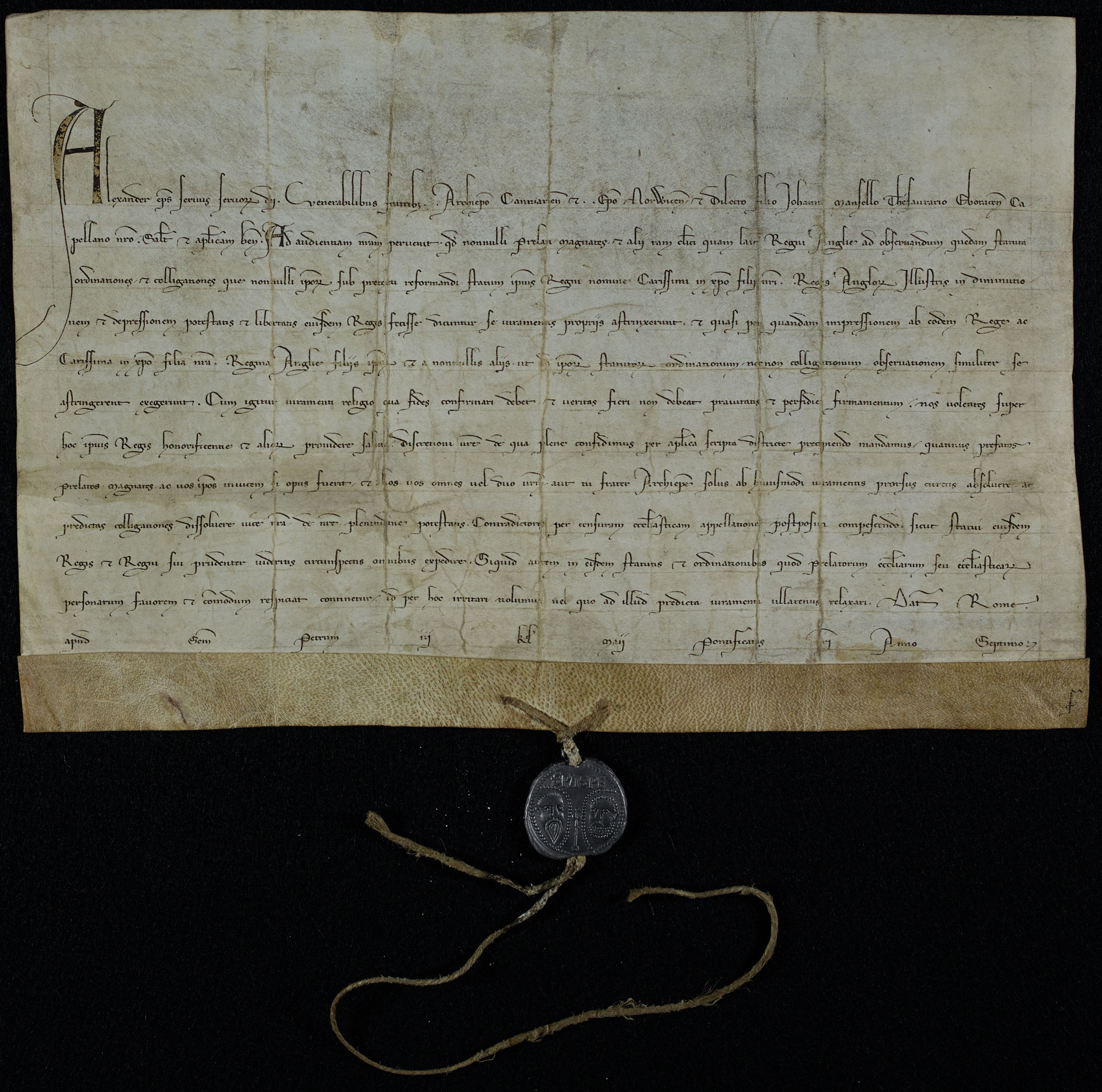
Pope Alexander IV issued this declaration on 29 April 1261. It condemned the reform movement, and absolved the barons and bishops of England from any oaths they had taken in support of the reforms. This gave Henry III authority to reclaim power against the barons who stood against him. Dated 1261 (SC 7/3/29).
Transcript
Bishop Alexander, the servant of the servants of God [sends] greeting[s] and his apostolic benediction to our venerable brothers, the Archbishop of Canterbury and the bishop of Norwich, and to our beloved son John Mansell the Treasurer of York, our chaplain.
It has come to our ears that some prelates, magnates, and others, both clerics and laymen, of the kingdom of England have bound themselves by personal oaths to observe certain statutes, ordinances, and regulations, which some of them are said to have written, under the pretext of reforming the state of this kingdom, in the name of the illustrious king of the English, our most beloved son in God , for the diminution of the power and to the detriment of the freedom of that same king, and as if by some force, they demanded from the same king and our most beloved in God queen of England, and their children, and from some others that they similarly bind themselves to the observation of these statutes, ordinances, and regulations.
Since therefore religion should not be made the support of depravity and perfidy through an oath (through which faith and truth ought to be confirmed), we, wanting because of this to make provisions for the honour of this king and for the salvation of others, strictly command to your discretion (in which we have complete faith) through our apostolic writings, that you all, or you two, or you, brother Archbishop, alone, should take care to entirely absolve from this oath the aforementioned prelates, magnates, and you yourselves in turn, if it is necessary, along with others, and to annul the abovementioned regulations, in our place, with the full amount of our power:
Objectors are to be suppressed by means of ecclesiastical judgment, all appeal having been put aside, just as it will have seemed expedient to you, after everything has been reviewed. If anyone however keeps himself to these same statutes and ordinances, because he cares for the favour and interest of the prelates, the churches, or the ecclesiastics, we do not wish for this to be made void through this, or that, with respect to this, the aforementioned oaths should be relaxed in any way. Given in Rome at St Peter’s, on the 3 Kal. May, in the seventh year of our pontificate.
Original translation by Maroula Perisanidi.
Simplified transcript
Bishop Alexander, the servant of the servants of God sends greetings and his apostolic benediction to our venerable brothers, the Archbishop of Canterbury and the bishop of Norwich, and to our beloved son John Mansell the Treasurer of York, our chaplain.
It has come to our ears that some bishops, barons, and others, both clerics and laymen, of the kingdom of England, have bound themselves by personal oaths to observe certain statutes, ordinances, and regulations, which some of them are said to have written, with the intention of reforming the state of this kingdom. They demanded from the king and our most beloved in God, queen of England, and their children, the observation of these statutes, ordinances and regulations.
Since religion should not be made to support the depravity and faithlessness through an oath, which is something through which faith and truth or to be affirmed, we strictly command that you should entirely absolve from this oath the bishops, barons and you yourselves in turn, if it is necessary, along with anybody else, and we command that you act as our representatives and annul the statutes, ordinances and regulations with the full amount of our power.
Objectors to this command are to be suppressed by means of ecclesiastical judgement.
Given in Rome at St Peter’s, on 29 April in the seventh year of our pontificate.
